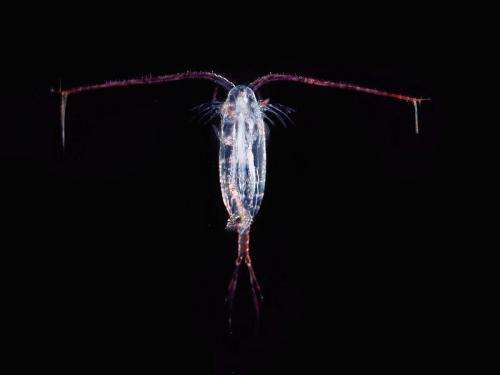April 27, 2016 report
Copepods found to engage in risky behavior after consuming toxic algae

(Phys.org)—A small team of researchers from the University of Maine, the Georgia Institute of Technology and Perdue University has found that copepods that eat a certain type of toxic algae react to it by engaging in unusual behavior that ultimately puts them at risk from other predators. In their paper published in Proceedings of the Royal Society B, Rachel Lasley-Rasher, Kathryn Nagel, Aakanksha Angra and Jeannette Yen describe a study they carried out of copepods called Temora longicornis off the eastern coast of the U.S. and in their lab and what they discovered as a result.
Copepods are tiny shrimp-like creatures that are part of the plankton that many other species (baby fish, small fish, clams, jellyfish, oysters, shrimp, etc.) use as a food source. In this new effort, the researchers wanted to know what impact eating the toxic algae that sometimes occurs as part of a red tide might have on copepods in general, and T. longicornis in particular. They captured multiple specimens from the Golf of Maine and brought them back to their lab for testing. The team reports that after consuming the toxic algae, Alexandrium fundyense, the copepods began to swim in ways that were unusual for them—moving faster and in straight lines.
This, the team reports, resulted in causing the copepods to become more at risk of being eaten by predators. By swimming in straight lines, the little creatures ventured farther, which brought them into contact with more predators, also, swimming faster created bigger wakes which tended to draw more attention to them. Through testing, the researchers found that the copepods swam up to 25 percent faster and that the altered behavior caused them to be from 25 to 55 percent more likely to be consumed by a predator.
The findings by the team suggest that there could be deeper impacts due to red tides than has been known—in addition to causing seafood that humans eat to become poisonous, more copepods dying could mean a greater increase in the numbers and size of red tides in the future, and still unknown impacts up the food chain—as just one example, some studies have shown that many species that ingest prey containing toxins from algae, become lethargic which can lead to a slow death.
More information: Rachel S. Lasley-Rasher et al. Intoxicated copepods: ingesting toxic phytoplankton leads to risky behaviour, Proceedings of the Royal Society B: Biological Sciences (2016). DOI: 10.1098/rspb.2016.0176
Abstract
Understanding interactions between harmful algal bloom (HAB) species and their grazers is essential for determining mechanisms of bloom proliferation and termination. We exposed the common calanoid copepod, Temora longicornis to the HAB species Alexandrium fundyense and examined effects on copepod survival, ingestion, egg production and swimming behaviour. A. fundyense was readily ingested by T. longicornis and significantly altered copepod swimming behaviour without affecting copepod survival or fitness. A. fundyense caused T. longicornis to increase their swimming speed, and the straightness of their path long after the copepods had been removed from the A. fundyense treatment. Models suggest that these changes could lead to a 25–56% increase in encounter frequency between copepods and their predators. This work highlights the need to determine how ingesting HAB species alters grazer behaviour as this can have significant impacts on the fate of HAB toxins in marine systems.
Journal information: Proceedings of the Royal Society B
© 2016 Phys.org




















